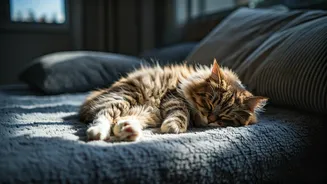Ancestral Instincts
Cats have a deep-rooted connection to their wild ancestors. In the wild, cats must conserve energy for hunting. Hunting requires short bursts of intense
activity, which is why cats conserve their energy. Sleeping allows them to build up their energy reserves for these moments. This behavior is deeply ingrained in their DNA. Even domesticated cats retain this instinct. They continue to nap throughout the day. This inherited behavior, coupled with the need to conserve energy, explains why your indoor cat enjoys extended periods of sleep.
Conserving Energy
Cats are natural predators, which means their bodies are built for short bursts of intense activity followed by periods of rest. In the wild, cats expend a lot of energy hunting for prey. They often stalk, pounce, and chase, all of which require a lot of physical effort. To ensure they can be successful hunters, they sleep. This conserves the energy they need. Even in a comfortable home, where food is readily available, the cat's body continues to operate on this principle. Sleeping frequently allows them to recharge. This is for any potential action.
Boredom & Lack
Sometimes, a cat’s excessive sleeping is simply a sign of boredom. Without enough stimulation, cats can become inactive and spend more time napping. If your cat lacks enough toys, playtime, or interaction, they may resort to sleeping to pass the time. Environmental enrichment can significantly reduce boredom. Providing interactive toys, scratching posts, and regular playtime helps to keep your cat mentally and physically engaged. This can minimize boredom-induced sleepiness. A stimulated cat is usually a less sleepy cat.
Weather Influences
Weather conditions can also influence a cat’s sleep patterns. When it is warm, cats tend to be more active. This is because they do not have to expend energy keeping warm. In colder weather, cats may sleep more. This helps them conserve body heat. Indoor cats are less affected by these temperature changes due to controlled environments. However, the instinct to adjust their activity levels based on temperature might still play a role. Understanding these external factors can provide more insight into your cat's sleeping habits.
Unwell or Sick
Increased sleep can sometimes be a signal that something is wrong. When cats are unwell or experiencing pain, they tend to sleep more than usual. This is a natural response. It's a way for the body to conserve energy and focus on healing. If your cat suddenly starts sleeping a lot more than usual. This is an indicator that there may be something wrong. Monitoring their eating habits, litter box usage, and overall behavior can help detect potential health issues. If you notice any other unusual symptoms, it is essential to consult with a vet.
Stress or Anxiety
Like humans, cats can experience stress and anxiety, which can affect their sleep patterns. If a cat is feeling stressed, it might withdraw and sleep more. Stressors can include changes in the household. These changes may include new pets, renovations, or even a change in their owner's routine. Anxious cats seek comfort through sleep. Providing a secure and safe environment is crucial. This can help to alleviate these feelings. Offering a quiet space, consistent routines, and positive interactions can reduce stress and promote healthy sleep patterns.
Age Related
A cat's age also plays a significant role in their sleeping behavior. Kittens, for example, sleep a lot because their bodies are developing rapidly. Senior cats also tend to sleep more. This is because their metabolism slows down, and they require more rest to maintain their energy levels. As cats age, they might develop health issues. This may contribute to increased sleep. Monitoring a cat's sleep patterns can help you track their overall health. This also helps to recognize any potential changes that might require attention.




















